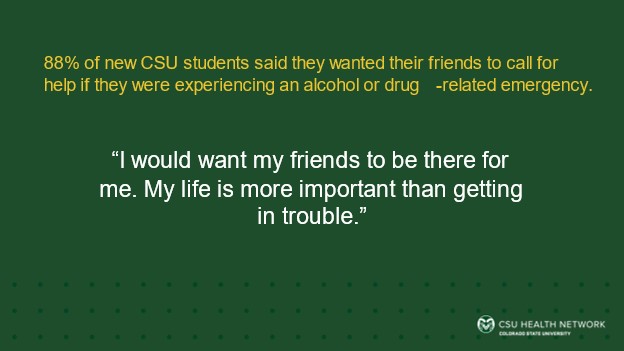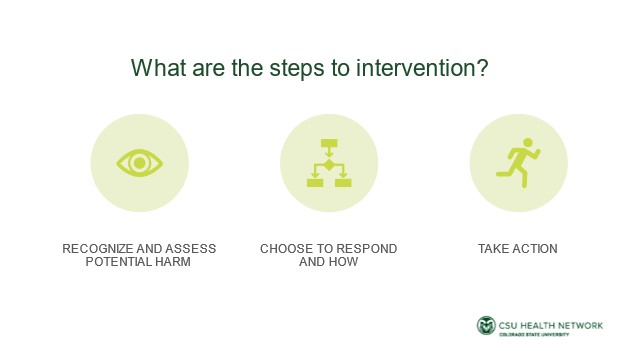Rams Take Care, Rams Take Action
Being an active bystander can prevent a potentially harmful situation from escalating. CHECK, CALL, CARE. CHECK for signs of an emergency:- Cannot be roused and is unresponsive to your voice, shaking, or pinching
- Skin is cold, clammy, pale, bluish, and/or blotchy
- Shallow, irregular breathing (more than 10 seconds between breaths) or slow (8 or fewer breaths per minute)
- Exhibit mental confusion, stupor, or coma-like symptoms
- Have seizures, convulsions, or rigid spasms
- Vomits while asleep or unconscious and not awakened by it
- Stay with your friend
- Roll them on their side in case vomiting occurs
- Cooperate with police and emergency medical personnel
- Do not give them water, food, or medication


CSU Marijuana Policy Information
The Use and Possession of Marijuana is Prohibited on Campus
Colorado law may allow certain marijuana related activities, such as limited medical marijuana use and other recreational use and possession. However, using and possessing marijuana (or hemp) remains a crime under federal law. At the federal level, the Controlled Substances Act (CSA) criminalizes the growing and use of marijuana, and it is well settled that federal enforcement agencies can prosecute users and growers of marijuana. As a controlled substance, use and possession of marijuana is also prohibited by the Student Conduct Code and is not permitted on campus. In addition to being a federal offense under the CSA, the use of medical marijuana in the workplace is restricted by federal laws, such as the federal Drug-Free Workplace Act and the federal Drug-Free Schools and Communities Act. Those federal laws require the University to prohibit the use of marijuana on campus.
For CSU Students
Using or possessing marijuana is prohibited by the CSU Student Conduct Code, and students who use or possess marijuana are subject to discipline. Marijuana use or possession is prohibited across the entire campus, including all open areas and buildings, such as the residence and dining halls. CSU is not required to allow the medical or recreational use of marijuana in the residence halls or on campus, because marijuana is illegal under federal law. The Colorado State University Police Department will continue to enforce the campus-wide prohibition of marijuana.
Policy Exemptions
Marijuana derivatives that are or become legal under BOTH federal and state law, are prescribed or recommended by a duly licensed healthcare provider, and that have no psychotropic effects, are exempt from this policy.
For more information on this policy please vist: http://policylibrary.colostate.edu/policy.aspx?id=738
Medical Amnesty Policies
The University has adopted a Responsible Action Exemption policy for students seeking medical assistance for themselves or others for emergency situations that result from alcohol and other drug abuse. Students or organizations, both on and off campus, who seek medical attention or themselves or on behalf of another student related to the use of drugs or alcohol will not be charged with violations of the Student Conduct Code related to that incident, provided that the student completes an assessment and any recommended treatment by the Hearing Officer. If a student is under 21 years of age, parents may be notified. A student organization must also cooperate with University officials and provide training or educational programs for its members as required by the Hearing Officer. The University reserves the right to adjudicate any case in which the violations are egregious. Students in need of medical assistance can only receive one (1) exemption, regardless of who calls for assistance.
The University may consider all prior exemptions granted to student organizations in determining whether additional exemptions should be granted. If it is determined that a student organization is engaging in repeat, similar conduct that results in alcohol or drug related incidents that negatively impact the campus or community, exemptions may be denied. No exemptions will be provided related to any activities that may constitute hazing in violation of the Student Conduct Code or Colorado law. Failure to complete an assessment and treatment may result in charges filed by Student Conduct Services.
If a student/organization believes they qualify for a responsible action exemption, the following steps must be completed:
- The student/organization must make initial contact with the appropriate resource (i.e. law enforcement, medical personnel or University staff) as a result of their actively seeking out medical assistance for themselves or on behalf of another individual.
- The student/organization seeking assistance for an intoxicated student must give their name to law enforcement or staff, remain on scene, and cooperate with medical personnel, law enforcement, or University staff.
- The student/organization seeking an exemption must meet with Student Conduct Services staff and complete an assessment, educational program, or any additional treatment requirements of the Hearing Officer. Verification of completion must be provided to the Student Conduct Services.
911 Good Samaritan Law, C.R.S. §18-1-711
The 911 Good Samaritan Law states that a person is immune from criminal prosecution for an offense when the person reports, in good faith, an emergency drug or alcohol overdose even to a law enforcement officer, to the 911 system, or to a medical provider. This same immunity applies to persons who remain at the scene of the event until a law enforcement officer or an emergency medical responder arrives, or if the person remains at the facilities of the medical provider until a law enforcement officer, emergency medical responder, or medical provider arrives. The immunity described above also extends to the person who suffered the emergency drug or alcohol overdose event.
Alcohol and Other Drug Resources
For more information and resources please visit https://health.colostate.edu/alcohol-other-drugs/
